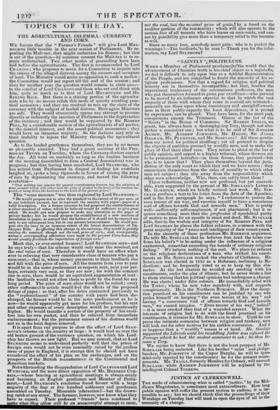"SAINTLY "POLITICIANS.
WHEN a Member of Parliament proclaimsito'the world that the- advancement of Christian truth is his chief object as a legislarbr, we feel it difficult to rely upon him as a faithful Representative of the People, and are compelled to doubt the sincerity of his re- ligious professions. Not that a regard for religion and political honesty are in themselves incompatible; but that, besides the impertinent irrelevancy of' the ostentatious profession, the men who put themselves forward as pious par excellence—who pretend to be moved by an influence saperior to that by which the vast majority of those with whom they come in contact are actuated—. generally are those upon whose consistency and straightforward- ness in their public capacity the least dependence, it is proved by experience, can be placed. They have been, for the most part, conspicuous among the Trimmers. Glance at the list of the " Saints " in the House of Commons. Sir ROBERT INGLIS, we grant, has always been a thoroughgoing Tory, though not alto- gether a consistent one; but what is to be said of Sir ANDREW AGNEW, Mr. ANDREW JOHNSTON, Mr. HARDY, Sir JAMES GRAHAM, Mr. PLUMPTRE, and Mr. SINCLAIR? All these gentle- men are noted for political shuttling ; yet all pretend to despise the objects of ambition pursued by worldly men, and to make the glory of God their chief care. They refuse to plead at the bar of public opinion, and appeal to a higher tribunal, whose decrees are to be pronounced hereafter—in their favour, they pretend—but who is to know that ? They place themselves beyond the juris- diction of the only court to which they and we have access ; they emancipate themselves from the rules of morality to which other men are subject ; they slip away from the responsibility which other men acknowledge. Who, then, can safely trust them ?
These reflections, neither new nor profound, but yet unavoid- able, were suggested by the perusal of Mr. SINCLAIR'S Letter to Mr. ROEBUCK, which we briefly noticed last week. Mr. Sin- CLAIR prefixes a text to his letter from the Acts of the Apostles; and in the first paragraph he says, "I endeavour to pursue the even tenour of my way, and exercise myself to have a conscience void of offence towards God and towards men." This is pretty well—sufficiently self-complacent, if not pharisaical; but it re- quires something more than the profession of apostolical purity of motive to pass for an apostle in mind and deed. Mr. SINCLAIR adds, that in the wisdom and integrity of Sir ROBERT PEEL and Lord STANLEY he places the fullest reliance, in common with the great majority of the "pious and intelligent of their countrymen." In the sincerity of these professions Mr. ROEBUCK acquiesces. He tells Mr. SINCLAIR that he believes him (and the letter con- firms his belief)" to be acting under the influence of a religious excitement, somewhat exceeding the bounds of ordinary religious feeling." We believe nothing of the sort. We place no reliance on the religious declarations of a man who tricked his consti- tuents as Mr. SINCLAIR tricked the electors of Caithness. Mr. SINCLAIR was elected in 1832 as a Reformer, inclining to Ra- dicalism; and he frequently voted so as to keep up this cha- racter. At the last election be avoided any meeting with his constituents, under the plea of illness ; but he never wrote a line to them stating that his political opinions had undergone a change. He was deem.' under false colours. He immediately sided with the Tories ; whom he now votes regularly with, and supports conspicuously. He is the Northern BuansTr. How the decep- tion practised on his constituents can be justified by one who prides himself on keeping" the even tenour of his way" and having "a conscience void of offence towards God and towards men," we cannot imagine. "Even tenour of his way," indeed! —it is more crooked than that of a wounded serpent. What the interests of religion had to do with the fraud practised on his constituents, it remains for Mr. SINCLAIR to show. Until he can prove the intimate connexion between religion and trickery, men will look out for other motives for his sudden conversion. And it so happens that a "worldly" reason is at hand. Mr. Sinclair supported the Liberals until his twaddling father was refused the Peerage which he had the modest assurance to ask ; he then be- came a Tory.
We rejoice to know that there is not the least prospect of Mr. SINCLAIR being reelected. Like his brother " saint " and pledge- breaker, Mr. JOHNSTON of the Cupar Burghs, he will be ignos miniously rejected by the constituency he for the present misre- presents. Mr. TRAILL, formerly Member for Orkney, will succeed SINCLAIR; while ANDREW JOHNSTON will be replaced by the intelligent Colonel TORRENS.


























 Previous page
Previous page